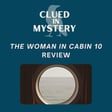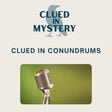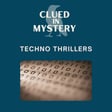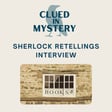Become a Creator today!Start creating today - Share your story with the world!
Start for free
00:00:00
00:00:01

Magic and Mystery (part 2) with Tom Mead
Brook and Sarah are joined by Tom Mead to continue their discussion about magic and mysteries.
Discussed
Death and the Conjuror (2022) Tom Mead
The Murder Wheel (2023) Tom Mead
The Best Mystery Stories of the Year 20 21 (2021) Lee Child (editor)
Knives Out (2019) Netflix
Death in Paradise (2011-2023) BBC
Jonathan Creek (1997-2016) BBC
Gigi Pandian Secret Staircase Mysteries
Death from a Top Hat (1938) Clayton Rawson
The Hangman’s Handyman (1942) Hake Talbot
Rim of the Pit (1944) Hake Talbot
“Murders in the Rue Morgue” (1841) Edgar Allan Poe
About Tom
Website: https://tommeadauthor.com/
For more information
Instagram: @cluedinmysteryContact us: hello@cluedinmystery.com Music: Signs To Nowhere by Shane Ivers – www.silvermansound.com
Transcript
Transcript
Introduction to Podcast & Guest
00:00:11
Speaker
Welcome to Clued in Mystery. I'm Sarah. And I'm Brooke, and we both love mystery. Hi, Brooke. Good morning, Sarah. Well, it's morning for us, but for our guest today who's in the UK, it's already the afternoon.
Tom Mead's Works and Inspirations
00:00:27
Speaker
Today we're continuing the conversation that we started last week about magic in mystery with author Tom Mead. Welcome, Tom. Thank you very much. Thank you both for having me.
00:00:41
Speaker
Tom Mead is a UK author specializing in locked room mysteries. He's a member of the Crime Writers Association and the International Thriller Writers Organization. He's the author of Death and the Conjurer and the sequel The Murder Wheel. His stories have appeared in Ellery Queen's Mystery Magazine, Alfred Hitchcock Mystery Magazine, and Mystery Weekly among others.
Why Locked-Room Mysteries?
00:01:05
Speaker
Several of his pieces have also been anthologized, including Heatwave in the Best Mystery Stories of the Year of 2021, which was edited by Lee Child. His debut novel, Death in the Conjurer, was selected as one of the top 10 best mysteries of the year by Publishers Weekly. So it's just a thrill to have you, Tom. Thank you. Yes, I'm delighted to be here. Thank you.
00:01:31
Speaker
So we both have enjoyed your books, Death and the Conjurer and the Murder Wheel. And you specialize in writing these locked room mysteries. Why do you think these were so popular in the Golden Age and actually seemed to be making a comeback?
00:01:50
Speaker
Well, I think the locked-room mystery is overall the most challenging, exciting and all-round interesting sub-genre really of detective fiction. For those who don't know the genre, it's a kind of a sub-species of the conventional puzzle mystery, the whodunit.
00:02:13
Speaker
But the question here in a locked room mystery is not just who committed a crime, but how physically the crime was committed. There's always the appearance that a criminal has done something physically impossible, whether that is vanished into thin air or crossed a patch of snow without leaving a footprint.
00:02:39
Speaker
The locked room or the impossible crime story has got a lot in common with stage illusion because there's often a sense of something uncanny or something supernatural at work, whether it's a phantom assailant or something similar, but there's always a rational earthly explanation.
00:03:04
Speaker
I think the appeal lies in the intellectual challenge.
Puzzle Plot Resurgence Discussion
00:03:09
Speaker
I think that's why the genre was so popular in the 20s and 30s because it really comes down to a battle of wits between the writer and the reader. It's a game of intellectual cat and mouse. And yes, the Golden Age, which is
00:03:31
Speaker
a term that typically refers to the period between the world wars when there was a real boom in that particular type of puzzle mystery. I think so that so the 20s and 30s really saw just a real boom in that particular type of puzzle where it was about
00:03:54
Speaker
engaging the reader on a surface level but also on an intellectual level. So it's about presenting an exciting story but also a puzzle to be solved and a game to be played. So as for the resurgence of the locked room, it's been in the works for a while now but I think people are being drawn towards
00:04:20
Speaker
more complex puzzle plots again thanks to certain mainstream hits like Knives Out.
The Magic-Mystery Connection
00:04:28
Speaker
Here in the UK Death in Paradise is a very big show which makes use of the puzzle plot but also the seeming impossibility so it's just great to see all these new writers embracing all the things that made the Golden Age great.
00:04:49
Speaker
So in your stories, Tom, you reveal some of the mechanics behind a few magic tricks. How much time did you spend researching popular illusions from the time period that you write about?
00:05:02
Speaker
Well, I am fascinated by magic tricks. In other words, the mechanics of magic tricks, so the physical gimmicks used by stage magicians. The murder wheel features the seemingly impossible materialization of a corpse on stage during a magic show. So to me, that was a kind of
00:05:27
Speaker
ultimate crossover between my interests in mystery and magic. But I do a lot of reading of non-fiction and historical works about the practice of stage magic and the history of it. And often that will stimulate ideas for the mysteries that I'm writing.
00:05:53
Speaker
The Victorian era was a time when stage magic really came into its own. There were many tricks, many gimmicks, many large-scale illusions.
00:06:09
Speaker
that were developed during that time that would become commonplace in the 20th century and would become standard theatrical practice. But during the sort of late Victorian era, these kinds of illusions were new and they were still being experimented with. And so I
Influence of Stage Magic on Writing
00:06:29
Speaker
think that is...
00:06:31
Speaker
If you like, the golden age of stage magic, when illusions and effects like Peppa's ghost and things like that, things were being devised and experimented in public for the first time.
00:06:52
Speaker
So I love to read about that kind of thing and think about how I could use that in a mystery plot, whether it be as a red herring, something to send the reader in the wrong direction, or whether it's an actual intrinsic part of the mystery itself.
00:07:16
Speaker
But I'm also fascinated by the theory behind stage magic, so how tricks work.
00:07:25
Speaker
in a more abstract sense, how they work on the brain, how as audiences we are guided to look in the wrong direction and the kinds of the gaps in our perception that magicians exploit. Which to me are similar to those that mystery writers exploit. In both cases you're
00:07:53
Speaker
you're sending an audience in the wrong direction you're working a trick in front of them and you're via misdirection you're making sure they don't spot how the trick works until you're ready to show them so yeah my writing is largely
Magic Tricks and Mystery Endings
00:08:17
Speaker
suggested by the general reading I do about magic and about magic theory, about the practical side, but also the theoretical side. Is it a no-no to reveal some of those secrets behind those tricks?
00:08:35
Speaker
For magicians, yes, definitely. But I am fascinated by how tricks are done and I think that's part of the fun. That's something that's always interested me. But then I'm not a magician.
00:08:51
Speaker
I don't claim to be a magician. So I'm quite happy to give away tricks because I think, well, it has a natural appeal to, you know, human curiosity. You want to know how something is done, but also that's the difference between magic and the locked room mystery. In the locked room, you have to give away the solution at the end. You have to explain how it was done.
00:09:21
Speaker
And the trick, it becomes a question of providing satisfaction to the reader, a satisfactory conclusion. If the gimmick is too ordinary, too prosaic and dull, then the reader is inevitably left feeling shortchanged. So I think, whereas magicians,
00:09:50
Speaker
are forbidden to show how a trick is done with the Mystery Writer it's about you are
Illusion Layers in Mysteries
00:09:59
Speaker
laying out the solution to the puzzle, but at the same time, you're trying to come up with the most colorful, exciting and intriguing solution as you can. I mean, I often talk about retrospective inevitability as a feature of a good mystery solution. This idea
00:10:26
Speaker
that your reader will kick themselves because they didn't spot the trick that was hidden in plain sight. And as a reader, that personally, that is one of the great joys of finding a good mystery, is when you see how you've been tricked and you see how the illusion was worked by the writer. And I love that.
00:10:52
Speaker
That's what I'm trying to do with these spectre books, to give readers that same feeling. So in some respects it's like a magic trick, my magic show. But because you inevitably have to lift the curtain at the end and reveal how it was all done, that's where the two differ.
00:11:21
Speaker
Yeah, that's fascinating. I love all the metaphors that you weave in to the stories about the similarities of the magic show and mystery fiction. In your latest book, The Murder Wheel, your magician sleuth is Joseph Spector, and he explains that there has been a, quote, trick within a trick. Would you say that that's essentially what's going on in all locked room mysteries?
00:11:50
Speaker
Yes, 100%. My approach as a writer of locked room mysteries, and the thing that I really appreciate as a reader,
Favorite Magician Sleuths
00:12:01
Speaker
is the different levels of illusion and mystification at work. So there can be physical tricks, as in clever gimmicks used to, for example, lock a door from the outside, that kind of thing. But then there are also more abstract tricks, which involve subtle placement of clues in plain sight.
00:12:31
Speaker
reinterpretation of a line of dialogue which takes on sudden significance when placed in a fresh context, also misdirection and deliberate
00:12:45
Speaker
obfuscation concerning identities and disguise, things like that. And I think the best examples of the genre are the ones where all of those different levels of illusion come into play at once. For me, the writer that really opened my eyes to the scale and the true potential of the lockdown mystery is John Dixon Carr. He was one of the, he was
00:13:15
Speaker
One of the greatest authors of the Golden Age, I would place him up there with Agla Christie, Ellery Queen, all the greats, but he was the acknowledged master of the Lottery and Mystery, not just because he was so prolific in that genre, but because he was so imaginative, so creative, and no two of his books
00:13:41
Speaker
are the same. He didn't recycle or reuse tricks in the way that some Golden Age authors did.
00:13:52
Speaker
And I mentioned clue placement. Agatha Christie was a true master of that, but so was Carr, and so was Ellery Queen. The placement of clues, the different variety of clues, and the playfulness of some of them. I think that's all
00:14:16
Speaker
I think it all kind of feeds into one entity and really, in a locked room mystery, you want all of that. You want the fun, but you want the atmosphere, the sense of mystique, but at the same time, a kind of tongue-in-cheek humor to it.
Atmospheric Elements & Influences
00:14:36
Speaker
That's great. And just building on that kind of idea of the overlap between magic and mystery and fun, having a magician as a sleuth is a great character. So who are some of your fictional favorites, either contemporary or some from the Golden Age? Well,
00:14:58
Speaker
When it comes to magician sleuths, I grew up watching the BBC show, Jonathan Creek, where the amateur detective is a man who designs illusions for a professional stage conjurer. So that show was great because it had a lot of humor, it was amusing. But at the same time, it featured very complex,
00:15:26
Speaker
fair play puzzle plots in the golden age tradition so all the clues were there and there was great ingenuity in the plotting so it was that was a nice kind of entry level locked room mystery experience when i was younger it was a great way to kind of discover the genre
00:15:49
Speaker
In terms of contemporary writers and magician sleuths, my friend Gigi Pandian, she writes several different series, but her secret staircase mysteries are particularly
00:16:08
Speaker
good in my opinion because they they they feature impossibilities, impossible crimes, locked room mysteries, magic tricks, all kinds of fun things and her detective Tempest Raj is a is a magician so I would definitely recommend the the secret staircase mysteries
00:16:32
Speaker
But going back to the Golden Age, the archetype of the Golden Age sleuth, this idea of the amateur detective who's roped in by police or the authorities to investigate because they have a particular insight or skill at deduction.
00:16:50
Speaker
I think it lends itself naturally to having a magician or someone who specializes in illusions as a detective. Clayton Rawson wrote a great series featuring a magician as a detective.
00:17:05
Speaker
who is known as the great Molini. He first appears in Death from a Top Hat, which is a superb locked room mystery, but also fascinating social document, if you like, about
00:17:21
Speaker
stage magic during that period. It's got so many references and, you know, little in-jokes and things concerning stage magic and the theatrical life at that time. Because Clayton Rawson, as well as a mystery novelist, he was a magician himself, and he was a friend of John Dixon Carr, who I've already mentioned. So yes, the Merlini series is particularly interesting.
00:17:51
Speaker
for someone like me, certainly, who loves magic, but who's also fascinated by the clever, complex plotting and the misdirection, et cetera. But there's another author from that era who, he was a professional magician.
00:18:15
Speaker
himself and he only wrote a couple of novels but they're both really brilliant. His name was Henning Nelms, that was his real name.
00:18:28
Speaker
He wrote under the pseudonym of Haik Tolbert and he wrote two books which are truly fantastic. The first one was called The Hangman's Handyman. That's a good one. But then the second one, The Rim of the Pit, is his absolute masterpiece. It's a perfect
00:18:46
Speaker
cocktail of illusion and atmosphere where a group of people are stranded in a snowbound cabin and they find themselves assailed by seemingly supernatural forces but of course because it's a fair play locked room mystery there is a rational explanation for it all and it and it unfurls incredibly satisfactorily
00:19:15
Speaker
So I'd definitely recommend seeking out Haight Tolle but like I say there are only two novels and The Detective is not a magician but because Henning Nelms himself was a magician and wrote many interesting works about the practice of stage magic I think it still qualifies.
00:19:38
Speaker
Those are fantastic recommendations, Tom. And those titles by Tolbert, his titles are fantastic too. Most definitely, yes. Room of the Pit gives you a kind of a hint of something otherworldly going on, something supernatural, something demonic. And the stories are really crammed with atmosphere. John Dixon Carr was also
00:20:05
Speaker
superb at creating an atmosphere of kind of creeping dread and eeriness and the hint that maybe there is something supernatural going on. I think that comes from Edgar Allan Poe, the kind of gothic tradition which, because Poe
00:20:27
Speaker
ostensibly wrote the first locked room mystery, Murders in the Room Org, and he was a great innovator of detective fiction generally. But his fictional detective, Auguste Dupin, was a huge influence on Conan Doyle's characterization of Sherlock Holmes, which in turn influenced the Golden Age. So I think there's kind of a thread of the Gothic and a
Upcoming Books & Reader Engagement
00:20:56
Speaker
You know, a sense of atmosphere, a kind of vivid, lurid, occasionally gruesome atmosphere to these stories, which really sets them apart, I think, and that's part of the appeal for me.
00:21:15
Speaker
And I definitely sense that in your work too, Tom, you have that same atmosphere, the feeling of, you know, questioning what's really going on. Is there something supernatural? You accomplished that really well. Um, I think that we've already answered the, our final question. So I'm going to go off script just a little bit and just ask you what you're working on next.
00:21:40
Speaker
Yeah, absolutely. That's a great question. I'm actually between books at the moment. I have finished book three in my Spectre series. It is called Cabaret Macabre and it comes out next summer.
00:21:57
Speaker
again, published by Mysterious Press. And I am about to begin work on book four. So like I say, I'm between the projects, but I'm currently stockpiling ideas for the next one. That's great. We're looking forward to it. Yes, thank you very much. I hope you'll enjoy it. And so Tom, where can our listeners find you?
00:22:21
Speaker
Oh, yes, I'm on all the social media, at Tom Meade author. So I do Facebook, I find is a great way to engage with readers directly. But I'm also on Twitter X, whatever you want to call it. I recently joined Instagram and
00:22:45
Speaker
I'm also on Blue Sky, if any of your listeners are on Blue Sky, I'm on there. And my website is tommeadauthor.com.
Conclusion and Farewell
00:22:55
Speaker
That's wonderful. Thank you again for joining us, Tom. This has been such a great, I feel like we have an overview of the history of magic and mystery, and this is going to be so worthwhile, I know, to our listeners. My pleasure. Thank you both for having me.
00:23:11
Speaker
And thank you all for listening today on Clued In Mystery. I'm Brooke. And I'm Sarah. And we both love mystery. Clued In Mystery is produced by Brooke Peterson and Sarah M. Stephen. Music is by Shane Ivers at Silvermansound.com. Visit us online at CluedInMystery.com or social media at Clued In Mystery. If you liked what you heard, please consider subscribing, leaving a review, or telling your friends.
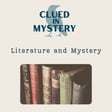
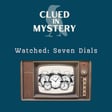
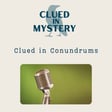
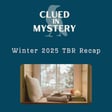
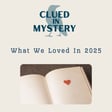
![[Re-release] Anthony Berkeley image](https://media.zencastr.com/cdn-cgi/image/width=112,quality=85/image-files/61e1c276e3ec42007857cff9/e7c778ac-a2ba-4809-9a5c-7cd39d167834.jpg)
![[Bonus] Wake Up Dead Man image](https://media.zencastr.com/cdn-cgi/image/width=112,quality=85/image-files/61e1c276e3ec42007857cff9/e276ac32-e664-464f-956c-7699bdb60aa5.jpg)
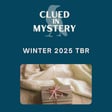
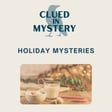
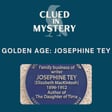
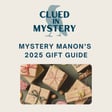
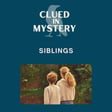

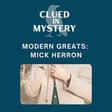
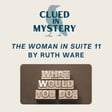
![[Bonus] Read Along: Daughter of Time image](https://media.zencastr.com/cdn-cgi/image/width=112,quality=85/image-files/61e1c276e3ec42007857cff9/b953ad72-c43e-48ca-a18a-b3c216ab90ee.jpg)
